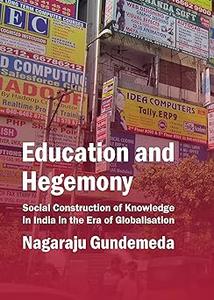
Free Download Nagaraju Gundemeda, "Education and Hegemony: Social Construction of Knowledge in India in the Era of Globalisation"
English | ISBN: 1443859702 | 2014 | 210 pages | PDF | 956 KB
Globalization is a multidimensional concept that encompasses the politico-economic, socio-cultural and educational spheres of contemporary societies across time and space. The ideological convictions and methodological subscriptions of social scientists guide the discourse on globalization to unravel the meanings and implications for institutions, individuals and social groups in shaping and changing their everyday life experiences. Globalization unleashed major lessons and has played a key role in shaping the educational systems of developing countries, including India. In this context, this book: maps the multiple epistemological traditions to approach the conceptual formulations of the globalization of education; examines the socioeconomic context of the globalization of education in India; analyzes the local responses to processes associated with the knowledge discourse; and examines the relation between the globalization of education and its implications on the functioning of institutional structures, such as caste, class, gender, marriage in general, and the education system in particular. The book proposes various secondary readings and empirical observations of the global political and regional social economies that have, in fact, been guiding the Indian education system. The institutional engagement with globalization needs to be located within the framework of social mobility either to extend or retain the social position of groups within the current social hierarchy. This book proposes that the globalization of education not only hegemonizes the nature and direction of education, but also hierarchizes the production and consumption of knowledge systems. The hierarchical knowledge system tends to legitimize market-driven education by simultaneously marginalizing the other multiple streams of knowledge systems. The marginalisation of liberal knowledge creates a one-dimensional pedagogy which tends to erase the tradition of critical reasoning which questions the oppressive elements of the state and suppressive values of the civil society.
Read more
